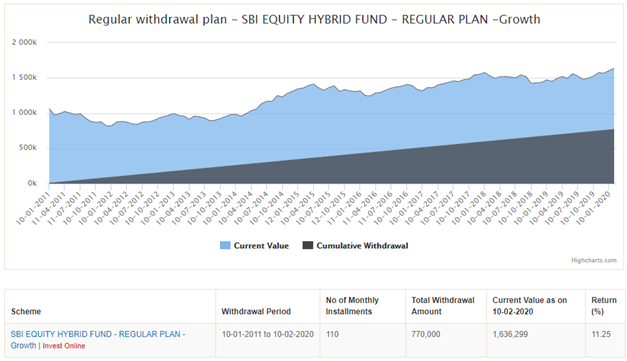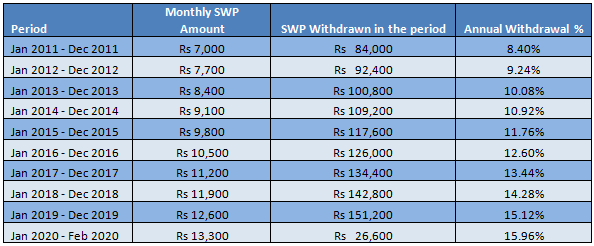SBI Equity Hybrid Fund: Outstanding long term SWP returns even with annual increase

Selecting a mutual fund scheme is an important aspect of your investment decision. We have discussed many a times how to select funds for your investment needs based on your risk appetite and investment goals. Once you have zeroed in onto the right category of funds based on these two factors, you should select schemes which have a strong long term performance track record.
SBI Equity Hybrid Fund is a great example of a fund with a strong long term performance track record. We give lot of importance to performance consistency versus short term returns. We urge investors to use our tool, Top Consistent Mutual Fund Performers to see the most consistent performers in any particular mutual fund category.
SBI Equity Hybrid Fund is one of the most consistent performers in Aggressive Hybrid Funds category. It has given double digit returns in the last 1, 3, 5 and 10 years period. Also by delivering over 14% annualized returns since inception (December 1995), the fund has created huge wealth for investors who stayed in the long term with the fund. The scheme was launched in December 1995 and has over Rs 31,000 Crores of assets under management (AUM) as on 31st December 2019. The expense ratio of the scheme is 1.72%.
In this blog post we will analyze the SWP returns of SBI Equity Hybrid Fund.
Systematic Withdrawal Plan (SWP)
In a SWP, investor can regularly withdraw a fixed amount on a fixed date or dates from a mutual fund scheme. The amount to be withdrawn and the frequency of withdrawals (e.g. weekly, fortnightly, and monthly, quarterly or annually) are decided by the investor. SWP withdrawals from an equity or equity oriented fund after one year from the date of investment, is subject to long term capital gains taxation. Long term capital gain of up to Rs 1 Lakh in a financial year is tax exempt. Long term capital gains in excess of Rs 1 Lakh are taxed at 10%. SWP is an ideal investment option for investors with lumpsum investible surplus and looking for regular income from their investments and capital appreciation at the same time.
Suggested reading – how SWPs are smart option to get regular income from your investment
SWP as a long term income solution
One query we get regularly from investors, especially retirees is, whether SWP is an effective retirement planning solution keeping in mind the inevitability of market cycles. In our view SWP from hybrid aggressive funds can be an excellent, tax efficient solution to supplement your post retirement income provided you have a long term view on your investments and also have the appetite to take moderate to moderately high risk.The other reason is because the debt portion of the hybrid aggressive schemes provides stability to the investment in volatile markets, while the equity portion generates capital appreciation for investors over long tenors.
For the purpose of back testing, we selected SBI Equity Hybrid Fund, an aggressive equity oriented hybrid fund and took 10 year period.
SBI Equity Hybrid Fund SWP Returns
Let us assume that you invested Rs 10 Lakhs in SBI Equity Hybrid Fund on January 1, 2010. You waited for a year to begin your monthly SWP as the gains after a year will be treated as long term. The monthly SWP amount you chose is Rs 7,000 (this comes to 8.4% annually). This is just a hypothetical example purely to show how SWP works over a period of time. Let us see the results of this example -

Source: Advisorkhoj SWP Returns Calculator
The above results show that you have withdrawn 110 instalments of Rs 7,000 each and the total withdrawal amount during the period (1st Jan 2011 to 1st Feb 2020) is Rs 770,000. You can also see in the above result that value of your investment of Rs 10 Lakhs in SBI Equity Hybrid Fund – Regular Plan Growth has grown to over Rs 16 Lakhs (as on February 10, 2020)despite the regular withdrawals – A capital appreciation of Rs 6.36 Lakhs.The fund gave 11.25% annualized return over the chosen time period.
SBI Equity Hybrid Fund SWP Returns with Annual Increase
Some investors may want their cash-flows to go up over time to overcome inflation. Investors have the flexibility of increasing their monthly withdrawals in an SWP. However, in our view, investors may also increase the withdrawal amount annually only if the returns are higher than the annual withdrawal rate of SWP.
Let us see, what would have been the result had you increased the monthly SWP amount by 10% annually. As you can see in the summary below, you would have withdrawn Rs 10.85 Lakhs during the chosen period (An excess of Rs 3.15 Lakhs over the normal SWP explained above). You can also see that the value of your investment of Rs 10 Lakhs in SBI Equity Hybrid Fund – Regular Plan Growth would have grown to Rs 11.73 Lakhs (as on February 10, 2020) despite the regular withdrawals – A capital appreciation of Rs 1.73 Lakhs.
The fund gave 11.11% annualized return over the chosen time period.

Source: Advisorkhoj SWP with annual increase Returns Calculator
Let us now see how your monthly SWP amounts increased (at annual frequency) over the chosen time period. As you can see, you started with 8.40% annual withdrawal (Rs 7,000 monthly) and now the withdrawal rate is 15.96% (Rs 13,300 monthly)! However, the fund has still been able to give you capital appreciation as you started with a moderate withdrawal rate.

The above example demonstrates that you would have been able to continue the SWP at higher withdrawal rates also and still have some capital appreciation.
Having written the above, we think increasing the monthly SWP amount by 10% annually maybe a bit higher, therefore, increasing the SWP amount annually should be reviewed annually based on how the fund performed in the last year/ the fund value post SWP withdrawals, etc. Increasing SWP maybe suggested for meeting your rising monthly income due to inflation. However, if you are able to manage with the current monthly withdrawal amount and have other means to meet your monthly cash flow needs then you should not increase the withdrawal amount. This will help you get higher capital appreciation in the long term.
How SWP in a mutual fund work
You should understand that SWP generates monthly cash-flows by redeeming units of the scheme you have invested in at prevailing NAVs on the chosen SWP dates. If your withdrawal rate is high, then more units will be redeemed to provide cash-flows. If unfortunately, the market conditions turn bad soon after you started your SWP, then for higher withdrawals a lot more units will have to be redeemed in a bear market. This will affect your long term returns.
In the above two examples, since your withdrawal rate was moderate when you started the SWP, you were not only able to sustain your SWP, but also able to generate capital appreciation in the long term. You should begin with a moderate SWP withdrawal rate and over a period of time, as your investment grows in value, you can also increase your withdrawal rate as discussed earlier. In our opinion, withdrawal rate from your SWP should not exceed 8-8.5% per annum to start with.
Conclusion
In this article, we discussed how our hypothetical SWP from SBI Equity Hybrid Fund generated cash-flows for investors and at same time also created substantial amounts of wealth even after the SWP amount was increased per annum. We also discussed taxation on SWP, withdrawal rates, fund selection etc. SBI Equity Hybrid Fund is a great choice for SWP over a long investment horizon. You should consult with your financial advisor SBI Hybrid Equity Fund is suitable for your investment needs.
Mutual Fund Investments are subject to market risk, read all scheme related documents carefully.
RECOMMENDED READS
- Demystifying debt mutual funds
- Why Balanced Funds may be the best investments for new mutual fund investors
- How do you know if you have good funds in your mutual funds portfolio: part 1
- Know your mutual fund tax obligations to manage your investments effectively
- Asset Allocation is much more important than fund selection
LATEST ARTICLES
- SBI Multi Asset Allocation Fund: Power of Multi Asset Allocation in Volatile Markets
- SBI Multi Asset Allocation Fund: Power of multi asset allocation in volatile market
- SBI Multicap Fund: Off to a great start
- SBI Balanced Advantage Fund: Benefits of growth and stability
- SBI Conservative Hybrid Fund: A suitable fund for first time investors with stellar track record of consistent outperformance
Quick Links
Follow SBI MF
More About SBI MF
POST A QUERY




